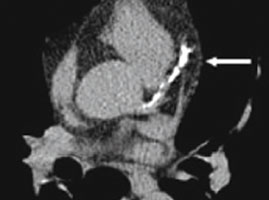CT calcium score
23 May 2021 / 4:25 pm
What is it ?
A calcium score is an x-ray test of the heart to identify any calcification in the walls of your heart arteries. Studies have shown that people with a higher calcium score are more likely to have blockages within the heart arteries. The test is also useful to guide the use of certain medications (such as “statins”) to reduce fatty deposits in the walls of the heart arteries. The Agatston score is rated as normal (zero), elevated (1 to 400) or high (greater than 400).

How is it performed ?
The test is performed using a computed tomography (CT) scanner. You will be asked to lie down on a special bed so that the CT scanner can move around you. X-rays are then directed towards your heart whilst you hold your breath for a few seconds.
How long does it take ?
The calcium score takes approximately 15 minutes.
Are there any risks ?
All x-ray radiation carries a risk of causing cancer. This risk is minimised with modern CT scanners. The calcium score will only be requested if it is felt that the benefits of the test outweigh the small risk to your health.
What happens next ?
Once you have had your test, the images will be analysed and a report generated. If the calcium score is particularly elevated then further investigations may be required.